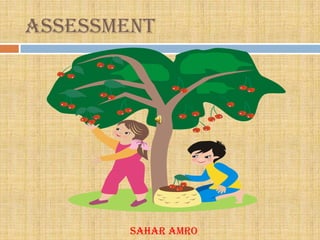
What is assessment
- 1. Assessment Sahar Amro
- 2. What is assessment? Assessment is a process by which information is obtained relative to some known objective or goal. Assessment is a broad term that includes testing. A test is a special form of assessment. Tests are assessments made under contrived circumstances especially so that they may be administered.
- 3. Important point In other words, all tests are assessments, but not all assessments are tests. We test at the end of a lesson or unit. We assess progress at the end of a school year through testing.
- 4. So……… Assessment is the systematic gathering and analyzing of information (excluding course grades) to inform and improve student learning or programs of student learning in light of goal- oriented expectations
- 5. Why Do We Assess? To know if students can apply what they have learned in authentic situations.
- 6. What is evaluation? Evaluation is perhaps the most complex and least understood of the terms. Inherent in the idea of evaluation is "value." When we evaluate, what we are doing is engaging in some process that is designed to provide information that will help us make a judgment about a given situation.
- 7. What do we assess? We assess learning, and we evaluate results in terms of some set of criteria. These three terms are certainly connected, but it is useful to think of them as separate but connected ideas and processes.
- 8. The Differences between Assessment and Evaluation Assessment Evaluation Assessment is the gathering of information Evaluation is the act of setting a value about something, such as student on the assessment information. performance. Assessment is information Evaluation is a judgment Assessment is qualitative Evaluation is quantitative Assessment pinpoints specific strengths Evaluation ranks and sorts individuals and weaknesses within groups Assessment is diagnostic and formative, as Evaluation is only summative well as summative
- 9. Assessment Evaluation Assessment is most useful to teachers and Evaluation is most useful to students administrators, politicians and parents Assessment focuses on the individual Evaluation focuses on the group student Assessment is an educational measure Evaluation is a political/administrative measure Assessment is referenced by criterion Evaluation is referenced by norm
- 10. Why Do We Assess? To Improve To Inform To Prove
- 11. Why is it important to assess? *To find out what the students know (knowledge). *To find out what the students can do, and how well they can do it (skill; performance) *To find out how students go about the task of doing their work (process). *To find out how students feel about their work (motivation, effort).
- 12. Assessment Diagnostic Formative Summative
- 13. What are the functions of assessment? Diagnostic: tells us what the student needs to learn . Formative: tells us how well the student is doing as work progresses. Summative: tells us how well the student did at the end of a unit/task
- 14. How should we assess? Day-to-day observation Tests and quizzes Rubrics Rating scales Project work Portfolios
- 15. Types of assessment Assessment as learning: can be used in conjunction to support student achievement: is used for the purposes of greater learning achievement . is a process of developing and supporting students’ active participation. Is used for purposes of providing evidence of achievement for reporting.
- 16. Comparison between the three types Assessment for learning Assessment as learning Assessment of learning *Assessment for learning is *Assessment as learning *Assessment of learning ongoing, diagnostic, and actively involves students. It occurs at end of year or at formative. is ongoing, and it involves key stages. It is summative. self and peer assessment. It is for grading and Report cards. *diagnostic and formative *self-assessment *summative *teacher assessment, student *the development of self- *teacher assessment self-assessment, and/or assessment skills student peer assessment
- 17. What is authentic assessment? Authentic assessment aims to evaluate students' abilities in 'real-world' contexts. In other words, students learn how to apply their skills to authentic tasks and projects.
- 18. In authentic assessment, students: *do science experiments *conduct social-science research *write stories and reports *read and interpret literature *solve math problems that have real-world applications
- 20. Thank you for participation Assessment